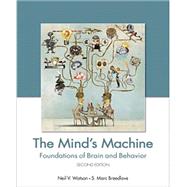The Mind's Machine, introduced in 2012, was written to impart the core concepts of behavioral neuroscience to students in a diverse range of disciplines, including not only psychology and the other life sciences, but art, philosophy, media studies, linguistics, and the like. Through the use of streamlined text, full-color art, novel pedagogical features, and real-life examples and analogies, the book succeeded in engaging students new to neuroscience without sacrificing accuracy.
Put to the test by faculty and students, The Mind's Machine proved itself to be accessible and reader-friendly--not to mention affordably priced--and the Second Edition is no less so.
If you are teaching a brain and behavior, biopsychology, or physiological psychology course, you will want to consider this book!
KEY FEATURES
NEW! Signs and Symptoms
This new feature highlights important clinical issues related to the chapter topics that apply behavioral neuroscience to the study of clinical disorders.
Vignettes
Each chapter begins with a gripping vignette relating the material that follows to a real-life situation.
Visual Summary
A graphic layout helps organize the material, and directs students to the figures that reinforce each point. Bold-faced key terms, callouts to pertinent figures, and references to the Companion Website are provided.
Parts
Larger, standalone "Parts" of chaptersare written discretely to maximize flexibility in assigning readings.
Marginal Glossary
Bold-faced terms are defined in the margins of the text to help students identify and learn key terminology as they read.
Researchers at Work
Important discoveries are explained and illustrated to highlight the process of experimentation and hypothesis testing.
QR Codes
Using their smartphones, students can instantly access support material from the Companion Website, such as animations, activities, and videos to further explain topics.
Color Art
The figures are beautifully drawn to aid students' understanding of biological processes. Concisely labeled and explained, the figures are one of the strongest pedagogical features in the text.
Boxes
Boxes describe interesting applications, important methods, sidelights, historical perspectives, or refreshers on theoretical concepts.
A Step Further
This feature offers additional, more advanced material for an instructor who wants to make certain topics more challenging or for students who want to know more
"How's it going?" Questions
At the end of each section are review questions to help students organize and rehearse what they've learned from the text.
Photographs
Photographs show students "real-life" examples of concepts and topics.








